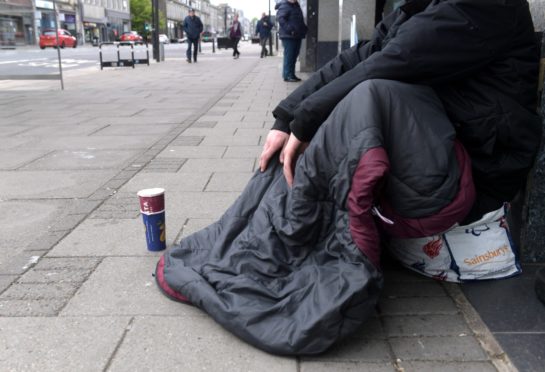At this time of year our senses are often heightened as we are made aware of the misfortune of others. We should appreciate how lucky we are to have families with whom we can to share Christmas.
I always feel more conscious of homeless people, many of whom end up sleeping on our streets. In Scotland there are 51,000 homeless people. Not all of them sleeping rough. But many do and have to resort to begging.
During the height of the pandemic many local hoteliers showed their compassion and offered accommodation for those with no fixed abode. But recently there has been a large increase in their numbers in the streets of Aberdeen.
There are a host of reasons as to why people become homeless. The lack of affordable housing, poverty and unemployment. Often people who are released from prison, have left care or are discharged from the forces with no place to go. Others flee from physical or sexual abuse. Many have serious mental issues. All have stories to tell.
What’s needed is some bold action to help them.
In truth, there have always been homeless people. But the figures mushroomed and never recovered from the economic policies pursued by Prime Minister Margaret Thatcher during the mid 1980s. She famously, but stupidly declared: “there is no such thing as society”. People were encouraged to think only of themselves and a culture of greed along with the feeling that only the strong could survive. This led to an underclass who were excluded from society.
At the start of the millennium, I put forward a plan to the Convention of Scottish Local Authorities (Cosla) to help. I believed we should take homeless people off the streets. I felt we could work with local hoteliers to provide them with temporary accommodation. The local authority would agree to pay the cost of that. The next step was to arrange for the councils to train the people and provide them with work.
The councils would pay the homeless for their work and they would be required to pay part of those wages to help pay towards their accommodation. Once they were used to this routine, the local authority would move them into supported council houses, where they would pay their rent, and become full time members of the workforce.
The idea of supported accommodation was to help those that required it, to budget, shop and re-engage with society. Many homeless people have suffered harsh life experiences and need support and time to adjust and rebuild their lives. Eventually, as they felt part of society, they would contribute as we all do in our own way.
Unfortunately, despite my best efforts at social inclusion and attempting to integrate less fortunate people into society, the leaders of Cosla at that time felt it would be too costly to fund. They cited the selling off of council housing and constant reductions in council budgets. But the real reason was it wasn’t a priority for them as there weren’t many votes in it.
Initiatives like money boxes for donations and selling the Big Issue magazine were useful but haven’t really had the impact that people thought. And despite politicians falling over themselves to express their concerns for homelessness and mental health issues, funding of these services has actually been reduced. No one has been able to resolve this problem.
As I look around our streets I do wonder if its time to have this idea reconsidered.
There are numerous jobs which need tackling in this city. Broken pavement slabs, dirty looking buildings, statues needing cleaning, litter and, as has been highlighted elsewhere, plaques remembering people who have made huge strides in science, education etc requiring upgrading. Things which would make our city more attractive to visitors.
So, there is an idea for any aspiring politicians out there.
But let me give a shout out to the willing volunteers and staff at the Len Ironside Centre who, under Covid rules, will be providing hot meals, a safe space to relax and gifts during the Christmas period. A welcome initative for homeless people, many of whom have no family to share Christmas with, and a compassionate commitment from those volunteers in the LI Centre who embody the spirit of Christmas.
The people of the north-east have always been great supporters of local charities. Let’s hope that following this disastrous year, we can face 2021 with a more caring and compassionate approach towards others.
Len Ironside is a former champion wrestler who served as an Aberdeen councillor for 35 years, four years as council leader











